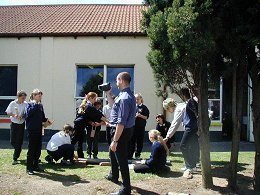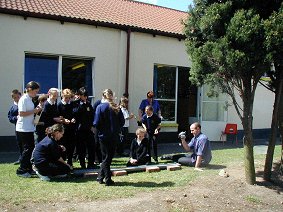Introduction | Who we are | Peer to peer| Activities | Project Findings
Teacher benefits
The majority of teachers could see the positive pedagogical outcomes of integrating
ICT into the curriculum. The school ethos of sharing ICT skills and providing
training for teachers, as well as the use of laptops at home, is giving teachers
the foundation to incorporate ICT across the curriculum. However, teachers
would like greater access to technology for pupils at all times, not only
timetabled sessions in the computer room. ICT "can aid teachers in getting
to the heart of the learning objective they are trying to teach." (UK
teacher)

Pupil Motivation
Teachers and pupils report that the impact of ICT has been substantial on
pupil attitudes to learning: One teacher said "the motivation and the
way the children concentrate is the biggest value for me." The Head teacher
said ICT had positively affected all the children's learning. Teachers said
that children with special educational needs could produce high quality outcomes
using ICT, which raised the pupils' self esteem and raised the profile of
learning and achievement.
Organisation of the Lap tops
Each class is timetabled to use the laptops twice a week so teachers don't
need to book them in advance. The wireless connectivity of the laptops solved
the issue of pupils storing and retrieving individual work files, as pupils'
work and school resources could be saved onto the schools network and accessed
remotely via the wireless connection.
"The head has lent (lap tops) out to teachers on a semi permanent loan arrangement. If a teacher wants a laptop they have access to one at home as well." (UK teacher)

Efficiency, saving time on production
Once teachers possessed ICT skills, the production and storage of resources
was significantly aided by the technology. Also the electronic submission
of teachers' lessons plans every two weeks facilitated sharing and editing
curriculum activities between teachers.
"We do our planning on the laptops. We also do the end of year reports on the computers and we tend to keep all the schools records on the computers and do the analysis. I find it easier to keep things on the computer, it's easier to find it and to make changes." (UK teacher)
"I think more and more teachers are using more and more ICT in their planning...the head has told us that he wants all the planning to be computerised within the next 12 months. Our reports have been computerised over the past couple of years. I know that the head will be asking us to upload all of the resources we produce onto the schools intranet or our Internet site." (UK teacher)
Teachers' professional development and collaboration
Teachers have access to formal and informal support networks for providing
ICT skills. These networks included training courses at school, colleagues,
family and friends. Access to the technology and a network of support has
emerged as critical factors supporting change. One teacher said "The
ICT coordinator has set up some ICT training sessions for those teachers and
teaching assistants who don't feel comfortable using the laptops, those are
building up people's skills and confidence. " The head teacher explained
"Its part of being part of the school, wanting to show the children that
we're all learners. I don't mind going to ask someone if I cant do something
on a laptop. We try to promote that openness so that they don't feel threatened
when they don't know, then they're more likely to ask. Again, through the
laptops, ICT has helped us to become a true learning organisation."

Pedagogical practices
The availability of laptops has enabled teachers to plan lessons and curriculum
activities that not only integrated ICT into the classroom, but also enhanced
the pupils' learning by focusing on the learning outcomes. Teachers used a
variety of software such as word processing, presentations, spreadsheets and
specialist software. One very enthusiastic teacher explained "the laptops
can enable the teacher to focus on the learning objectives. I think for example
of a newspaper article. I produced a template in a desktop publisher. The
children could get straight into typing the newspaper article. I was able
to focus more on writing in the style of a newspaper reporter". Another
teacher enthused "We use a lot of PowerPoint. The children really like
writing things in PowerPoint, animating and putting sounds on; they love doing
that. I teach them to do it like a book they do a contents page with slides
that link to the different contents. We do a lot of word processing work writing
stories and editing it. We do spreadsheet work, teaching them how to do graphs,
using the wizard to produce the graphs and then we put callouts on to interpret
the graphs. I find this useful; because when pupils do a pencil and paper
graph, it takes them forever to get it laid out right and they've had no time
to interpret it. With Excel they put the data in and within a second they
have a graph and they are starting to interpret it, once they have the ICT
skills of course."
The laptops were timetabled into specific lessons, which enabled teachers to plan ICT into those lessons. Consequently teachers had guaranteed access and would build ICT into the curriculum. One UK teacher stated "each teacher has a responsibility to use computers and teach the curriculum."
The collaborative web@classroom project with partner schools in Europe facilitated and encouraged the use of the Internet for curriculum work.
Innovation for community regeneration: bridging the digital divide.
The U.K school's ICT initiative, to build a connected learning community in
an area of considerable social and economic deprivation, provided a model
for bridging the digital divide through facilitating collaboration between
the school and its local community to support not only the learning of children,
but lifelong learning for the whole community. Access to laptops was provided
at school and at home is raising the profile of learning in the community.
The head teacher said "I discovered issues such as the digital divide which divides society. We felt that if we could bridge that divide, some of the other social exclusion issues could start to be addressed". He also reported "the parents felt quite complimented that we thought they were worth the investment because they were taking this high tech expensive kit home and we were saying to them 'you are worth it'."
E-mentors from industry were enlisted to provide online support and encouragement for pupils who may not have a male role model in the family. An E-learning foundation provided laptops through a low cost scheme. The laptop initiative has facilitated parents learning about ICT, and encouraged parents' ICT skills and confidence, raising their self esteem. Parents and grandparents were undertaking ICT courses provided through adult education courses run at the school and encouraged to build on them by continuing at higher education centers in the area. Certificates to recognize their achievements were presented in the school assembly. The head teacher explained "once the laptops started to go home, the parents became interested in the new technology. They didn't feel threatened by it because it was in their own home. They were coming to school saying 'my year 4 child knows more than me' etc. We could tell them about the ICT courses for adults and they would come along." The overall effect was to raise the profile of learning in the community and to provide a network of support for pupils and parents learning together. The evidence shows that 61% of pupils borrowing a laptop received help with their work from family or friends. 46 out of 47 pupils borrowing laptops reported that family and friends also used the laptop. ICT has been a catalyst for positive change in parent and pupil attitudes to school, schoolwork and to homework.
[Back]

